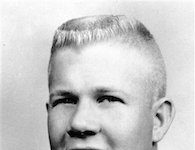On Aug. 8, 1974, President Richard Nixon, facing impeachment charges for his role in the Watergate Hotel break-in, announced his resignation.
The Watergate Scandal
At 2:30 a.m. on June 17, 1972, five men were caught trying to bug the Democratic National Committee’s office at the Watergate Hotel in Washington, D.C. The men were found to have large amounts of cash and connections to President Richard Nixon’s re-election campaign.
The FBI launched an investigation into their links to the presidency. Two Washington Post writers, Bob Woodward and Carl Bernstein, reported on the investigation, with help from a secret source: FBI official Mark Felt, who became known by the codename “Deep Throat.” The investigation revealed not only that the administration had orchestrated the Watergate break-in, but also that it had planned a spate of dirty tricks intended to discredit Democrats.
The Senate formed a committee to investigate Watergate in February 1973, and began hearings on May 17, 1973. The Watergate Hearings lasted nearly three months, with 319 hours covered on network television. The key witness was former White House Counsel John Dean, who revealed many key details of Nixon’s cover-up, calling it a “cancer on the presidency.”
Part of Dean’s testimony was that Nixon had secretly recorded many of his White House conversations. Special Prosecutor Archibald Cox, who had been appointed by Nixon, set out to find the tapes.
Nixon demanded that Cox be fired, but the U.S. attorney general and assistant attorney general refused to do so. In what would become known as the “Saturday Night Massacre,” Nixon forced them both to resign and appointed an attorney general who would fire Cox.
New Special Prosecutor Leon Jaworski continued the investigation and forced Nixon to hand over transcripts of his tapes, which revealed the cover-up in greater detail. In late July, the House of Representatives began the impeachment process, charging him with obstruction of justice, abuse of power and contempt of Congress.
On Aug. 5, a recording from June 1972 was released, revealing that Nixon and White House Chief of Staff H.R. Haldeman had conspired to thwart the FBI investigation by telling the CIA to shut it down. The so-called “Smoking Gun” cost Nixon any credibility he had left, leaving him with no other choice than to resign.
On Aug. 8, he made a nationally televised address from the Oval Office. “I have never been a quitter,” he said. “To leave office before my term is completed is abhorrent to every instinct in my body. But as president, I must put the interest of America first. America needs a full-time president and a full-time Congress, particularly at this time with problems we face at home and abroad. … Therefore, I shall resign the Presidency effective at noon tomorrow. Vice President Ford will be sworn in as president at that hour in this office.”
Nixon Pardoned by Ford
A month after his resignation, Nixon received a full pardon from President Gerald Ford, freeing him from the possibility of indictment or prosecution for his role in the Watergate scandal.
Biography: Richard Milhous Nixon
Nixon rose from humble beginnings in Whittier, Calif., to graduate from Duke Law School and join the Navy. A tenacious, hard-working loner with a distaste for elites and intellectuals, he became a congressman in 1946 and senator in 1950.
He gained a reputation as a strong anti-communist, leading the investigation against alleged Soviet spy Alger Hiss. In 1952, he was chosen to become Dwight Eisenhower’s vice president and would serve for two terms.
He ran for president in 1960, but lost a close and disputed election to John F. Kennedy. He returned to California and lost the 1962 gubernatorial election, after which he told reporters, “You won’t have Nixon to kick around anymore.”
His political career appeared to be over, but, in typical Nixon fashion, he would return to politics and win the 1968 presidential election. “He kept losing it, tumbling to great depths, then grimly climbing back,” wrote Time in his obituary.
After resigning from the presidency, he spent his later life traveling, writing and speaking about foreign policy. He died on April 22, 1994, after suffering a stroke.
Nixon and Watergate Resources
The Richard Nixon Library features biographies for Nixon and his wife, resources on the Vietnam War, an index of books written by Nixon, and a description of the library archives.
The Nixon Presidential Library & Museum features a large collection of documents written and received by Nixon, as well as the Watergate Tapes.
The Gerald R. Ford Library & Museum describes the scandal in-depth, including key documents, biographies and film reels.
The Washington Post, which played a central role in the Watergate investigation, recaps the scandal with links to its coverage, a timeline, cartoons and a list of key players.
The University of Texas’ Harry Ransom Center profiles the role of Woodward and Bernstein in the investigation into Watergate. Its includes documents and notes written by the two for their Washington Post articles, as well their books “All the President’s Men” and “The Final Days.”











